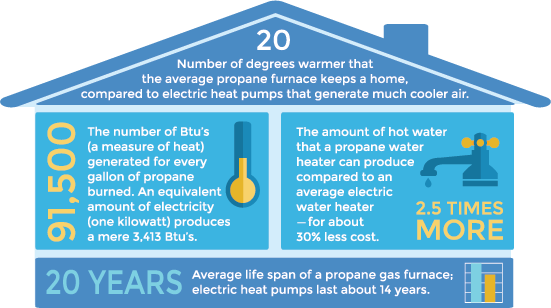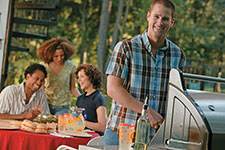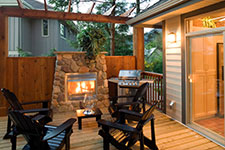Embrace the Propane Difference

Staying safe, saving money and keeping comfortable become a lot easier when you expand your use of propane.
propane vs. electricity: what’s the better deal?
Do the electric appliances in your home outnumber your propane gas appliances? You may be shocked to find out how much money you could start saving if you pulled the cord completely on your electric appliances and plugged into propane instead.
Take propane water heaters as one example. They generally cost 30% less to operate than electric ones — or 60% less if you use a tankless propane water heater. And don’t forget comfort! Propane water heaters can produce about twice as much hot water as electric units — in the same amount of time. If you’re tired of your electric water heater leaving you cold, contact us about converting to a propane water heater. It’s a lot easier than you may think!

Don’t stop with water heaters!
People are warming up to propane — and saving money — in many other ways too.
- Avoid the limitations of cooking with an electric stove. Propane ovens and ranges cost significantly less to operate than their electric counterparts and provide a higher degree of control because of precise temperatures. Plus, a gas stove will continue to work during a power outage.
- A propane clothes dryer gets laundry dry 25% faster than the typical electric model.
- Propane heaters for the garage and other cold spaces are a great option because they’re much less expensive to operate than portable electric heaters. Vented propane gas space heaters are easy to install, incredibly efficient and extremely safe.
- On a cold night, propane-heated homes are much warmer than those that rely solely on electric heat. With a clean-burning, highefficiency propane furnace, less than 10% of fuel is wasted in the combustion process. In comparison, more than two-thirds of the energy used by a power plant to generate and transmit electricity is wasted.
Feel free to contact us about the many ways you can save money by pulling the cord on electric appliances and plugging into propane.
outdoor living made easy
No other fuel can do as much as propane can to make lounging in your backyard a pleasant experience. And thanks to modern advances in flexible piping, you can now extend your use of propane to a wider range of outdoor products — even refrigerators and fireplaces!

Grill it up
Propane grills light instantly, heat faster than charcoal, and emit less carbon monoxide and soot. They make your food taste better too! For convenience’s sake, higher-end grills offer drawers, side burners, surface lighting and LED temperature displays.
People are taking cooking to new levels by adding cooktops, ovens and rotisseries to their deck or patio.

Swim it up
Whether you have an aboveground pool, an in-ground pool or a spa, a propane pool heater will warm your water much faster — and at a lower cost — than an inefficient electric heater.
Many propane pool heaters include sensors that shut off the unit if water temperatures rise above preset limits.

Warm it up
Take the chill out of the air with portable heaters and outdoor fireplaces, which can raise outdoor temperatures by as much as 30°. They’re great for prolonging your outdoor entertaining season!
Most portable heaters immediately shut down if the heater gets knocked over.
the yellow school bus goes green

Many states in the country have been adopting alternative energy incentive programs in recent years, resulting in more school districts purchasing propane autogas buses, according to the Propane Education & Research Council.
These school districts have realized enormous fuel savings by using propane autogas instead of diesel fuel. Propane costs about 50% less than diesel per gallon and reduces maintenance costs as a result of its clean-operating properties.
Additionally, propane-powered school buses perform better in cold weather than diesel-powered buses. They start more easily and their interiors heat faster so that windows become defrosted quickly.
Kids are benefitting from a healthier ride to and from school as well. Studies show that, when compared with the diesel buses they have replaced, buses fueled by autogas:
- emit 80 % fewer smog-producing hydrocarbons
- reduce nitrogen oxide emissions by about 10,000 pounds
- lower particulate matter by 315 pounds
